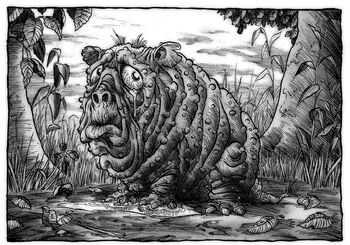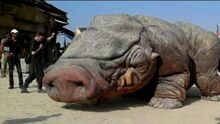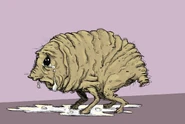No edit summary |
(Removed category no modern sightings) Tag: Visual edit |
||
| (35 intermediate revisions by 21 users not shown) | |||
| Line 1: | Line 1: | ||
| ⚫ | |||
| + | [[File:Squonk.jpg|thumb|350px|Artist illustration]] |
||
| ⚫ | |||
| ⚫ | |||
| ⚫ | |||
| ⚫ | The |
||
| ⚫ | The legend holds that the creatures skin is ill fitting, being covered with warts and that, because it is ashamed of its appearance it hides from plain sight, and spends most of its time weeping. Hunters who have tried catching squonks have found out the creature is capable of dissolving completely into a pool of tears and bubbles when cornered. A man named J.T Wentling is supposed to have coaxed the creature into a bag, of which when he carried it home it suddenly lightened. Upon further inspection he found that all that remained was the liquid remains of the sad animal. |
||
| ⚫ | |||
| + | |||
| ⚫ | |||
| + | |||
| + | ==Further reading== |
||
| + | [http://www.lib.lumberwoods.org/fclw/squonk.html "The Squonk" from ''Fearsome Creatures of the Lumberwoods'' (1910) by William T. Cox] |
||
| + | |||
| + | [http://www.lib.lumberwoods.org/fc/squonk.html "The Squonk" from ''Fearsome Critters'' (1939) by Henry H. Tryon] |
||
| + | |||
| + | |||
| + | <gallery> |
||
| + | Squonks.jpg|Another rendering of the squonk by Ashley Gerst: www.ashleygerst.com |
||
| + | Squonk-0.jpg |
||
| + | </gallery> |
||
| + | [[File:IMG 0271.JPG|thumb|220x220px]] |
||
| + | |||
| + | {{NavFearsomeCritters}} |
||
[[Category:Fearsome Critters]] |
[[Category:Fearsome Critters]] |
||
[[Category:North America (Minus Mexico and Caribbean)]] |
[[Category:North America (Minus Mexico and Caribbean)]] |
||
[[Category:Cryptids]] |
[[Category:Cryptids]] |
||
| + | [[Category:Cryptid Wiki]] |
||
| + | [[Category:Humanoids]] |
||
| + | [[Category:Ungulates]] |
||
| + | [[Category:Swine]] |
||
| + | [[Category:Mammals]] |
||
Revision as of 03:39, 14 February 2020

Artist illustration
The Squonk is a mythical creature reputed to live in the Hemlock forest of northern Pennsylvania. Legends of Squonks probably originated in the late nineteenth century, at the height of Pennsylvania's importance in the timber industry.
The earliest known written account of Squonks comes from a book by William T. Cox called Fearsome Creatures of the Lumberwoods, With a Few Desert and Mountain Beasts.
The legend holds that the creatures skin is ill fitting, being covered with warts and that, because it is ashamed of its appearance it hides from plain sight, and spends most of its time weeping. Hunters who have tried catching squonks have found out the creature is capable of dissolving completely into a pool of tears and bubbles when cornered. A man named J.T Wentling is supposed to have coaxed the creature into a bag, of which when he carried it home it suddenly lightened. Upon further inspection he found that all that remained was the liquid remains of the sad animal.
The scientific name of the squonk "Lacrimacorpus dissolvens" comes from the Latin words meaning tear, body, and dissolve.
Further reading
"The Squonk" from Fearsome Creatures of the Lumberwoods (1910) by William T. Cox
"The Squonk" from Fearsome Critters (1939) by Henry H. Tryon



